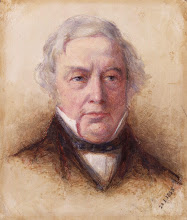VOTE THE LESSER
Ralph Nader got a lot of mileage out of his "evil of the two lessers" quip in the 2000 run for President. This was, of course, because of the tired old complaint that we are always being forced to vote for the lesser of two evils, as though that was a bad thing.
But wait a minute. That is precisely the proper stance to take when choosing between two candidates or among many candidates. That is, if we insist on using a voting system at all. It's like this, one should first ascertain they are all evil. This won't be too hard, you'll find. And by evil here is clearly meant unworthy, unqualified, or in some way unfit to hold the office. This initial effort might place a considerable burden on the voter in that one must learn all there is to know about the duties and the potential of the office and also read or listen to a all the candidate has had to say on any matter pertaining to these duties and potentials. And a good study of history wouldn't hurt either If the voter is diligent in these studies I am sure he will find all candidates unfit and he can begin the hard work of judging the least fit, the next least fit and so on. Unfortunately, I believe I am only talking about an ideal here, as the voters and pundits I observe seldom work this hard at selecting their politicians. But we all can learn.
Looking at it a different way, it is essential we do not vote for the most dangerous candidate, and so must above all ferret out the degree of danger each candidate represents. Moving up through the list we naturally arrive at the least dangerous. And then he or she is the least evil and our rational choice.
But wait a minute. That is precisely the proper stance to take when choosing between two candidates or among many candidates. That is, if we insist on using a voting system at all. It's like this, one should first ascertain they are all evil. This won't be too hard, you'll find. And by evil here is clearly meant unworthy, unqualified, or in some way unfit to hold the office. This initial effort might place a considerable burden on the voter in that one must learn all there is to know about the duties and the potential of the office and also read or listen to a all the candidate has had to say on any matter pertaining to these duties and potentials. And a good study of history wouldn't hurt either If the voter is diligent in these studies I am sure he will find all candidates unfit and he can begin the hard work of judging the least fit, the next least fit and so on. Unfortunately, I believe I am only talking about an ideal here, as the voters and pundits I observe seldom work this hard at selecting their politicians. But we all can learn.
Looking at it a different way, it is essential we do not vote for the most dangerous candidate, and so must above all ferret out the degree of danger each candidate represents. Moving up through the list we naturally arrive at the least dangerous. And then he or she is the least evil and our rational choice.

